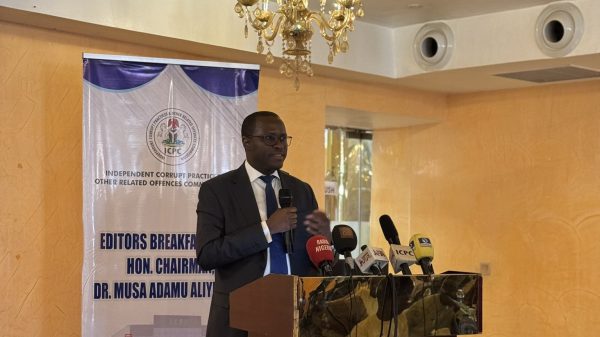Abuja, Nigeria
The chairman of the Independent Corrupt Practices and Other Related Offences Commission (ICPC), Bolaji Owasanoye, says pressure by community members on public officeholders for financial benefits fuels corruption in Nigeria.
Owasanoye spoke in Abuja on Tuesday at the national policy dialogue on corruption, social norms, and behaviour change, organised by ICPC and the Anti-Corruption Academy of Nigeria (ACAN) supported by the MacArthur Foundation.
According to the ICPC chair, many people expect public officials to confer the benefit of their offices on them regardless of whether such largesse is proceeds of corruption.
“The timing of this policy dialogue on corruption, social norms and behaviour change in Nigeria, could not have come at a better time than now when the foundation of our social values and norms has become seriously threatened,” Owasanoye said.
“In actual fact, a lot of changes are taking place across the wider Nigerian society. But more worrisome to me, is the emergence and pervasive spread of corruption-inducing social norms across all ethnicities and religious divides.
“In spite of the widespread cultural and religious perception of corruption as a negation of societal values, a survey carried out by ACAN-ICPC in 2020 revealed that corruption among public servants is enabled by community ambivalence towards the proceeds of corruption.”
He noted that 69 per cent of the public servants surveyed indicated that their community would accept monetary gifts above their annual salaries without questioning the source of the money.
“Corruption is therefore fueled by community expectation of people in the office,” he added.
“There is for example a general belief that groups, networks, and communities expect the holder of an office to confer benefits from (or of) the office on members of the community.
“This is regardless of whether the benefits are corrupt practices in themselves e.g., nepotism, or if the benefits come from proceeds of corruption e.g., embezzlement,” he said.
“It is equally expected that government officials should enrich (and/or confer other benefits on) themselves from their office.
“Relations and community members of public officials see nothing wrong with all these, even when they condemn such practices happening in other communities – a case of “it is good for us and not for other communities.”
